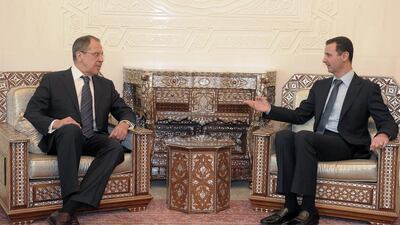Russia’s recent military intervention in Syria has changed the political complexion of one of the world’s most closely watched conflicts.
Writing in the pan-Arab daily Asharq Al Awsat, Tareq Al Humaid lamented that the Syrian civil war has taken a profound turn following Russia’s overt moves in Syria. The repercussions of the move will have local, regional and international effect. Syrian president Bashar Al Assad might be the biggest loser.
“One can now say that Bashar Al Assad is weaker than Khaled Mishaal, Hassan Nasrallah and Ali Abdullah Saleh and even weaker than Saddam Hussein in the last weeks before the American invasion of Iraq that toppled him,” Al Humaid wrote.
“Today, Mr Al Assad is a mere pawn on the chessboard of a game played by Russian president Vladimir Putin. Mr Al Assad is not Mishaal, who can still negotiate with Israel, nor is he Hassan Nasrallah who can ignite a war with Israel in southern Lebanon or facilitate the election of a Lebanese president. Neither is he Mr Saleh, who could forfeit the Houthis at any moment and still has the loyalty of a large number of Republican Guards. Whatever the outcome of the Russian intervention, it does not mean Mr Al Assad will stay in power,” explained Al Humaid. There seems to be a growing belief that Mr Al Assad is finished as a president.
“The question is: what about Mr Al Assad’s circle, his family, his sect? They have probably realised that he is finished and that he was but a card in the hand of Putin. When will Putin play this card? The future will tell,” he concluded.
In the pan-Arab daily Al Hayat, George Semaan wrote that Russian militarisation in Syria is a matter of showing off strength.
“All those concerned in the Syrian crisis, whether internally or externally, were not surprised by the presence of Russian experts to train the Syrian army on using weapons provided by its ally. Provisions are continuous and did not cease, even before the beginning of the crisis,” Semaan argued. Moscow’s decision to increase its military presence is due to a political decision to shore up an ally, a policy it adopted since the beginning of the conflict in Syria.
“Establishing a military base in this country will leverage the essential importance of Russia’s participation in any form of settlement and will ensure it has a say, being that it is the most active party today trying to push towards a settlement,” he noted.
“Russia does not need to be warned about direct intervention. Mr Putin has launched a political initiative by declaring that Mr Al Assad was willing to share power with the ‘constructive’ opposition. He punctuated it with a military manoeuvre.
“He did, however, leave the door open for possible intervention by saying that this is premature. Those who know Moscow do not believe it will go beyond specific operation by special units to eliminate ISIL cell leaders or Chechen elements fighting in Syria and Iraq. Any intervention will not go beyond interventions of the international coalition led by the United States in its war on terror in the Levant,” remarked Semaan.
Ultimately, if an intervention is necessary, Russia may be ready for it, the writer argued, but only after obtaining international cover from the Security Council or in concert with other players involved in the war on terrorism.
Translated by Carla Mirza
cmirza@thenational.ae

